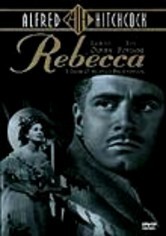Rebecca-1940
Director Alfred Hitchcock
Starring Laurence Olivier, Joan Fontaine
Top 100 Films #63
Scott’s Review #345
Reviewed January 9, 2016
Grade: A
The only Alfred Hitchcock film to win the coveted Best Picture Oscar trophy, Rebecca is a very early offering in the famous director’s repertoire.
His heyday being well ahead of this film (the 1950s and 1960s saw his best works), Rebecca is a blueprint of fine things to come and on its own merits is a great film.
Shot in black and white, the film is a descent into mystery, intrigue, and madness, with a gothic look to it.
Laurence Olivier stars as rich widower Maxim de Winter, whose first wife, title character Rebecca, died sometime before the story begins. In a clever twist, the character of Rebecca is never seen but takes on a life of her own through the tellings of the rest of the cast.
Joan Fontaine plays a nameless, naïve young woman who meets the sophisticated Maxim and marries him, becoming the new Mrs. de Winter.
This development is met with disdain by the servants who work in the Grand de Winter mansion, named Manderley, a character in its own right.
Housekeeper, Mrs. Danvers (Judith Anderson) in particular, is cold and distant from Maxim’s new wife, and begins to reveal an obsession with the deceased Rebecca, creating jealousy and intimidation for Fontaine’s character- so much so, that, she begins to doubt her sanity and decision-making capabilities.
Rebecca is a fantastic, old-style film, that provides layers of mystery and wonderment thanks to Hitchcock’s direction. The mansion that is Manderley is central to the story as is the obsession that creepy Mrs. Danvers has with Rebecca.
She keeps the dead woman’s bedroom neat, a sort of shrine to her memory, so much so that, despite the time the film is made, 1940, a lesbian element is crystal clear to attention-paying audiences.
This aspect may have not been noticed at the time, but in more recent times, this is quite obvious.
The film is also a ghost story of sorts since the central character, Rebecca, is never seen.
Could she be haunting the mansion? Is she dead or is this a red herring, created to throw the audience off the track? Is the new Mrs. de Winter spiraling out of control? Is she imagining the servant’s menacing actions? Is Maxim in on the tormentor simply seeking a replacement wife for his true love?
The pertinent questions not only are asked of the character but the audience themselves as they watch with bated breath.
The climax and finale of Rebecca (1940) are fantastic.
As the arguably haunted mansion is engulfed in flames and the sinister Mrs. Danvers can be seen lurking near the raging drapes, the truth comes to the surface leaving a memorable haunting feeling to audiences watching.
Rebecca is a true classic.
Oscar Nominations: 2 wins-Outstanding Production (won), Best Director-Alfred Hitchcock, Best Actor-Laurence Olivier, Best Actress-Joan Fontaine, Best Supporting Actress-Judith Anderson, Best Screenplay, Best Original Score, Best Art Direction, Black and White, Best Cinematography, Black-and-White (won), Best Film Editing, Best Special Effects
